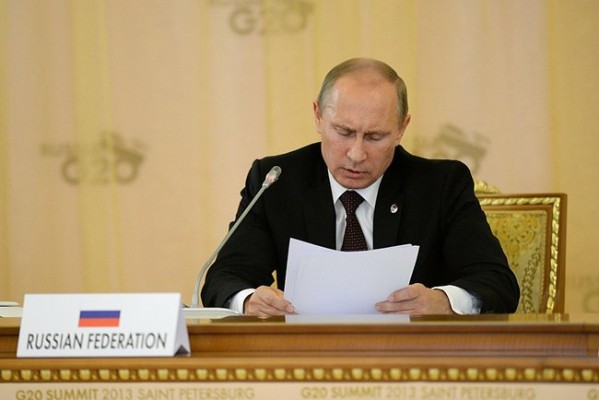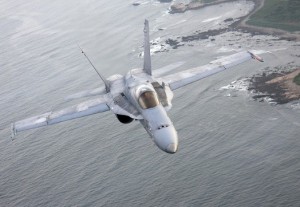
US-Russian Tensions Put Titanium Supply in Doubt
As the sanction war between Russia and the West heats up, two of the largest domestic suppliers of military technology to the Pentagon are scrambling to stockpile titanium from a Russian producer in order to hedge against a possible supply disruption. Boeing and United Technologies Corp. have substantial commercial and military ties to Russia’s VSMPO-Avisma Corp., the world largest producer of titanium and a subsidiary of state-owned industrial giant Rostec State Corp – whose CEO Sergei Chemezov has landed himself on the US’ sanctions list.
VSMPO accounts for 30% of the titanium used in the US aerospace industry, and Boeing and United Technology have been attempting to build a buffer against a supply disruption since the Russian annexation of Crimea in March. Because it is so lightweight and durable, titanium is an essential component in the construction of military-grade aircraft. The airframe of Boeing’s F/A-18 Super Hornet (featured below) contains 21% titanium, and the metal is used to make landing gears as well as in the construction of jet engines.

To make matters more complicated, Ukraine supplies a significant portion of titanium concentrate to Russia in order to produce the raw metal. Thus far, the titanium industry has been relatively unscathed by the escalation of tensions in Ukraine, but those reliant on the metal are not taking any chances.
Replacement suppliers could potentially take months to get up to speed on how to produce titanium parts with the necessary manufacturing certifications, and one industry official said that Boeing and United Technologies have been stockpiling as much as six months’ worth of titanium reserves. The US is import-dependent for 79% of the titanium it consumes. While it would be possible to increase domestic production, how much and how quickly would be up in the air.
Two Pittsburgh-based producers who would stand to benefit from an increase in domestic demand, RTI International Metals and Allegheny Technologies, are two of the four largest titanium producers in the world, but still trail far behind Russia’s VSMPO. RTI CEO Dawne Hickton is confident that domestic suppliers could make up for any supply shock.
“Quite frankly…when you look at our mill product side of the business, we have the raw materials sourcing capabilities, as well as the melting capabilities that we believe, the U.S.–not only just our company–but the U.S. supply could support any situation that were to occur.”
Boeing and United Technologies moves to stockpile reserves indicate that they are not nearly as optimistic as Hickton – at least in the short term.
US dependency on Russia for raw metals used for military weaponry also does not end with titanium. In the 2013 National Defense Stockpile Requirements Report submitted by the Pentagon, it was revealed that Russia supplies 10 of the 19 metals and minerals identified on the stockpile “shortfall” list. Of 5 of these 10, the US has zero on hand, and is over 70% import dependent for each of these 5. Metal dependence could be in the future what energy dependence is today if measures are not taken to alleviate this reliance on imports.
Past reports by ASP have detailed US dependence on China for rare metals used for military weaponry, and the current situation brewing with Russia presents another challenge that the US military faces. As the second-largest titanium producer in the world and a signatory to the proposed free trade Trans-Pacific Partnership (TPP), Japan could be a potential alternative source for not only titanium, but many other metals and minerals. The US could also look inward to domestic producers as a longer-term fix, but in the short term will need to look for producers around the world in case the Russian supply of titanium is severed.
In combination with US dependence on Russia- made RD-180 engines to propel military satellites into space and the recent scramble to find alternatives, the titanium situation provides yet another example of the perils of short-sighted trade policies, particularly when it comes to commodities needed for our military base. Free trade with a diverse number of nations around the world would provide the Pentagon with a safe and secure supply in case of geopolitical crises in any one nation or region and the US should keep this in mind when negotiating free trade deals such as TPP and the Trans-Atlantic Trade and Investment Partnership (TTIP).






Nothing has changed through 2014-2017, Boeing and others have not escaped from Russian sources of Titanium. Vice versa they have been quoted as promising to double their investments in Russia by the end of 2018.
Are some major US companies exempt from the federal laws???